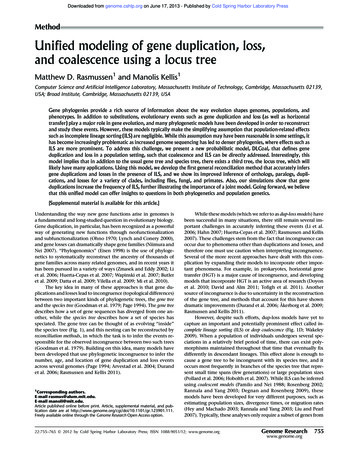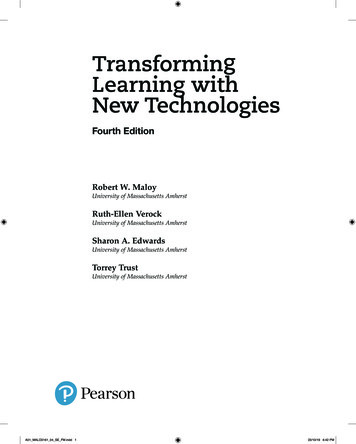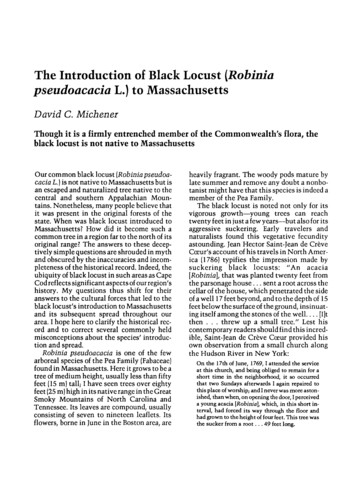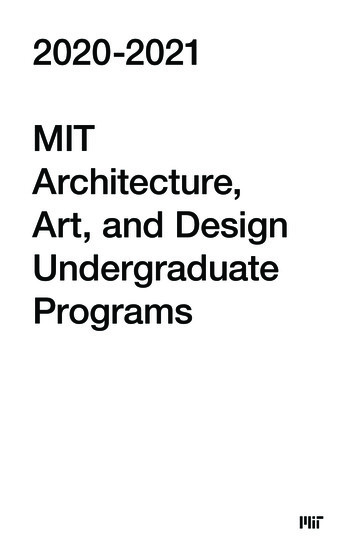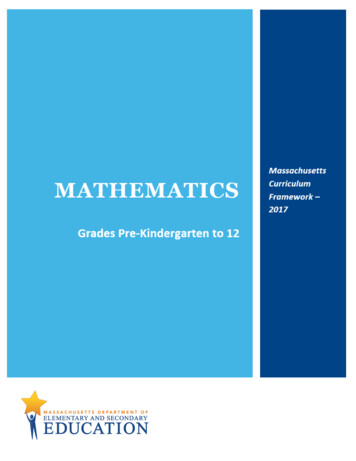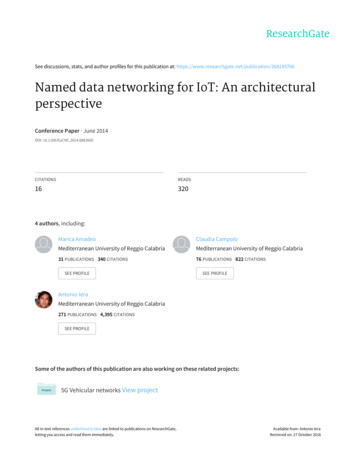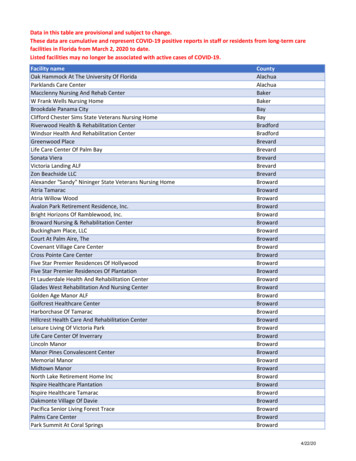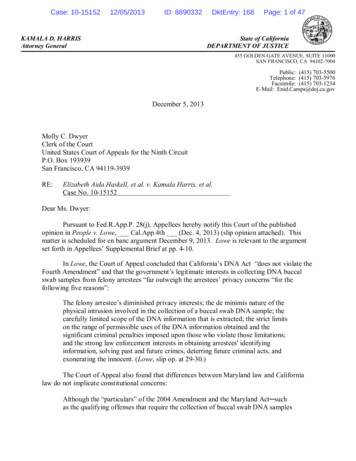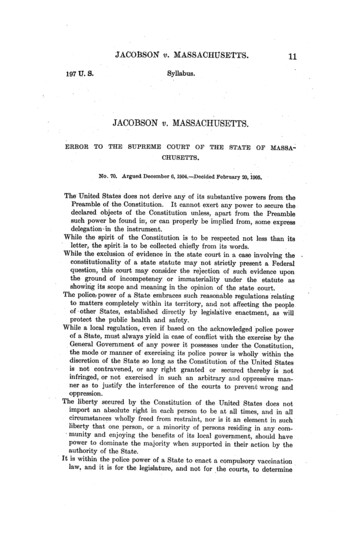
Transcription
JACOBSON v. MASSACHUSETTS.197 U. S.11Syllabus.JACOBSON v. MASSACHUSETTS.ERROR TO THE SUPREMECOURT OF THESTATEOF MASSA-CHUSETTS.No. 70. Argued December 6, 1904.-Decided February 20, 1905.The United States does not derive any of its substantive powers from thePreamble of the Constitution. It cannot exert any power to secure thedeclared objects of the Constitution unless, apart from the Preamblesuch power be found in, or can properly be implied from, some expressdelegation-in the instrument.While the spirit of the Constitution is to be respected not less than itsletter, the spirit is to be collected chiefly from its words.While the exclusion of evidence in the state court in a case involving theconstitutionality of a state statute may not strictly present a Federalquestion, this court may consider the rejection of such evidence uponthe ground of incompetency or immateriality under the statute asshowing its scope and meaning in the opinion of the state court.The police) power of a State embraces such reasonable regulations relatingto matters completely within its territory, and not affecting the peopleof -other States, established directly by legislative enactment, as willprotect the public health and safety.While a local regulation, even if based on the acknowledged police powerof a State, must always yield in case of conflict with the exercise by theGeneral Government of any power it possesses under the Constitution,the mode or manner of exercising its police power is wholly within thediscretion of the State so long as the Constitution of the United Statesis not contravened, or any right granted or secured thereby is notinfringed, or not exercised in such an arbitrary and oppressive manner as to justify the interference of the courts to prevent wrong andoppression.The liberty secured by the Constitution of the United States does notimport an absolute right in each person to be at all times, and in allcircumstances wholly freed from restraint, nor is it an element in suchliberty that one person, or a minority of persons residing in any community and enjoying the benefits of its local government, should havepower to dominate the majority when supported in their action by theauthority of the State.It is within the police power of a State to enact a compulsory vaccinationlaw, and it is for the legislature, and not for the courts, to determine
OCTOBER TERM, 1904.Statement of the Case.197 U. S.in the first instance whether vaccination is or is not the best mode forthe prevention of smallpox and the protection of the public health.There being obvious reasons for such exception, the fact that children,under certain circumstances, are excepted from the operation of thelaw does not deny the equal protection of the laws to adults if the statuteis applicable equally to all adults in like condition.The highest court of Massachusetts not having held that the compulsoryvaccination law of that State establishes the absolute rule that an adultmust be vaccinated even if he is not a fit subject at the time or thatvaccination would seriously injure his health or cause his death, thiscourt holds that as to an adult residing in the community, and a fitsubject of vaccination, the statute is not invalid as in derogation ofany of the rights of such person under the Fourteenth Amendment.case involves the validity, under the Constitution ofthe United States, of certain provisions in the statutes ofMassachusetts relating to vaccination.The Revised Laws of that Commonwealth, c. 75, § 137,provide that "the board of health of a city or town if, in itsopinion, it is necessary for the public health or safety shallrequire and enforce the vaccination and revaccination ofall the inhabitants thereof and shall provide them withthe means of free vaccination. Whoever, being over twentyone years of age and not under guardianship, refuses or neglects to comply with such requirement shall forfeit fivedollars."An exception is made in favor of "children who present acertificate, signed by a registered physician that they are unfitsubjects for vaccination." § 139.Proceeding ufider the above statutes, the Board of Healthof the city of Cambridge, Massachusetts, on the twentyseventh day of February, 1902, adopted the following regulation: "Whereas, smallpox has been prevalent to some extentin the city of Cambridge and still continues to increase; andwhereas, it is necessary for the speedy extermination of thedisease, that all persons not protected by vaccination shouldbe vaccinated; and whereas, in the opinion of the board, thepublic health and safety require the vaccination or revaccination of all the inhabitants of Cambridge; be it ordered, thatTHIS
JACOBSON v. MASSACHUSETTS.197 U. S.Statement of the Case.all the inhabitants of the city who have not been successfullyvaccinated since March 1, 1897, be vaccinated or revaccinated."Subsequently, the Board adopted an additional regulationempowering a named physician to enforce the vaccination ofpersons as directed by the Board at its special meeting ofFebruary 27.The above regulations being in force, the plaintiff in error,Jacobson, was proceeded against by a criminal complaint inone of the inferior courts of Massachusetts. The complaintcharged that on the seventeenth day of July, 1902, the Boardof Health of Cambridge, being of the opinion that it was necessary for the public health and safety, required the vaccination and revaccination of all the inhabitants thereof who hadnot been successfully vaccinated since the first day of. March,1897, and provided them with the means of free vaccination,and that the defendant, being over twenty-one years of ageand nbt under guardianship, refused and neglected to complywith such requirement.The defendant, having been arraigned, pleaded not guilty.The government put in evidence the above regulations adoptedby the Board of Health and made proof tending to show thatits chairman informed the defendant that by refusing to bevaccinated he would incur the penalty provided by the statute, and would be prosecuted therefor; that he offered tovaccinate the defendant without expense to him; and that theoffer was declined and defendant refused to be vaccinated.The prosecution having introduced no other evidence, thedefendant made numerous offers of proof. But the trial courtruled that each and all of the facts offered to be proved by thedefendant were immaterial, and excluded all proof of them.The defendant, standing upon his offers of proof, and introducing no evidence, asked numerous instructions to thejury, among which were the following:That section 137 of chapter 75 of the Revised Laws ofMassachusetts was in derogation of the rights secured to thedefendant by the Preamble to the Constitution of the United
OCTOBER TERM, 1904.Argument for Plaintiff in Error.197 U. S.States, and tended to subvert and defeat the purposes of theConstitution as declared in its Preamble;That the section referred to was in derogation of the rightssecured to the defendant by the Fourteenth Amendment ofthe Constitution of the United States, and especially of theclauses of that amendment providing that no State shall makeor enforce any law abridging the privileges or immunities ofcitizens of the United States, nor deprive any person of life,liberty or property without due process of law, nor deny to anyperson within its jurisdiction the equal protection of the laws;andThat said section was opposed to the spirit of the Constitution.Each of the defendant's prayers for instructions was rejected, and he duly excepted. The defendant requested thecourt, but the court refused, to instruct the jury to return averdict of not guilty. And the court instructed the jury insubstance that if they believed the evidence introduced bythe Commonwealth and were satisfied beyond a reasonabledoubt that the defendant was guilty of the offense charged inthe complaint, they would be warranted in finding a verdictof guilty. A verdict of guilty was thereupon returned.The case was then continued for the opinion of the SupremeJudicial Court of Massachusetts. That court overruled allthe defendant's exceptions, sustained the action of the trialcourt, and thereafter, pursuant to the verdict of the jury, hewas sentenced by the court to pay a fiwi6 of five dollars. Andthe court ordered that he stand committed until the fine waspaid.Mr. George Fred Williams, with whom Mr. James A. Halloran was on the brief, for plaintiff in error:The right of the State under police power to enforce vaccination upon its inhabitants has not yet been determined,or more than remotely considered by this court; referencesare made to it in Lawton v. Steele, 152. U. S. 133;,Hannibal&
JACOBSON v. MASSACHUSETTS.197 U. S.Argument for Plaintiff in Error.St. J. R. R. Co. v.Husen, 95 U. S.465; Am. School of Healing v. McAnnulty, 1 7 U. S.94. The plaintiff in error knowsof no other cases'in which the subject of vaccination has beenconsidered by this court. From a summary of vaccinationlaws and vaccipation statutes in the United States it appearsthat thirty-four States of the Union have no compulsoryvaccination law, as follows: Alabama, Arkansas, California,Colorado, Delaware,. Florida, Idaho, Illinois, Indiana, Iowa,Kansas, Louisiana, Maine, Michigan, Minnesota, Missouri,Montana, Nebraska, Nevada, New Hampshire, New Jersey,New York, North Dakota, Ohio, Oregon, Rhode Island, SouthDakota, Tennessee, Texas, Utah, Vermont, Washington, WestVirginia and Wisconsin.Compulsory vaccination exists in eleven States, as follows:Connecticut, Georgia, Kentucky, Maryland (of children),Massachusetts, Mississippi, North Carolina, Pennsylvania (insecond class cities), South Carolina, Virginia and Wyoming.In thirteen States exclusion of unvaccinated children from thepublic schools is provided, as follows: California, Georgia,Iowa, Maine, Massachusetts, New Hampshire, New Jersey,New York, Oregon, Pennsylvania; Rhode Island, SouthDakota and Virginia.Three-quarters of the States have not entered upon thepolicy of enforcing vaccination by legal penalty.' Not one ofthe States undertakes forcible vaccination, while Utah andWest Virginia expressly provide. that no such compulsion shallbe used.Smallpox has ceased to be the scourge which it once was,and there is a growing tendency to resort to sanitation andisolation rather than vaccination. The States which makeno provision for vaccination are not any more afflicted withsmallpox than those which compel vaccination. Even NewYork, which imports the major part of the immigrants whoannually enter this country, has not undertaken to force itupon the people. As to other countries, the Queen'of Hollandhas recently recommended the repeal of the compulsory vac-
OCTOBER TERM, 19n4.Argument for Plaintiff in Error.197 U. S.cination laws. There are no vaccination laws in New Zealand,and Switzerland has by plebiscite abolished all compulsoryvaccination.The English law, 61 & 62 Vict., ch. 49, provides only forthe vaccination of children, under a penalty, and furnishes tothe people a special Vaccinator.See ch. 299, Laws of Minnesota of 1903, abolishing vaccinStion, and veto in 1901 of Governor La Follette of vaccinationlaw of Wisconsin. In 1904 there were riots in Brazil arisingfrom attempts to enforce vaccination.For decisions of state courts involving vaccination lawswhich have mainly been decided upon statutes relating to theexclusion of children from the public schools see Bissell v.Davison, 65 Connecticut, 183; Abeel v. Clark, 84 California,226; State v. Zimmerman, 86 Minnesota, 353; Osborn v. Russell,64 Kansas, 507; Potts v. Breen, 167 Illinois, 67; Duffield v.Williamsport School District, 162 Pa. St. 476; State v. Burdge,95 Wisconsin, 390; Re Rebenack, 62 Mo. App. 8; Blue v. Beach,155 Indiana, 121. The only cases which have consideredgeneral compulsory vaccination laws are State v. Hay, 126N. Car. 999; Morris v. Columbus, 102 Georgia, 792; Re WilliamH. Smith, 146 N. Y. 68.None of these cases are as extreme as the decision inthe case at bar and the laws providing that unvaccinated children shall not attend the public schools are widelyvariant from laws compelling the vaccination of adult citizens.As to admitted functions of the police power, see 4 Blackstone, 162; Cooley's Const. Lim. 704; Han. & St. Jo. R. R. Co.v. Husen, 95 U. S. 465, 470; but the power is for the securityof liberty and not for oppression. Barbier v. Connelly, 113U. S. 27; Lawton v. Steele, 152 U. 8. 133.A compulsory vaccination law is unreasonable, arbitraryard oppressive; it is only effective in the protection of lawbreakers; the legal penalty is illogical and unjust. See underEnglish Act, 30 & 31 Vict., ch. 84, extent of penalties. Regina
JACOBSON v. MASSACHUSETTS.197 U. S.Argument for Plaintiff in Error.v. Justice, L. R. 17 Q. B. D. 191; Dutton v. Atkinson, L. R.6 Q. B. 373; Pitcher v. Stafford, 4 Vest. & S. 775; Allen v.Worthy, L. R. 5. Q. B. 163; Tebb v. Jones, 37 L. T. (N. S.) 576.The law is not of general application as children are exempted.Compulsion to introduce disease into a healthy system is aviolation of liberty. The right to preserve life is the mostsacred right of man, Slaughter House Cases, 16 Wall. 36,and is specially provided for in the Preamble of the FederalConstitution. If injured the person vaccinated is damagedwithout compensation. Miller v. Horton, 152 Massachusetts,546. The law is not within any cognizable principle of criminal law. 1 Bishop, §§ 204, 230, 490, 513; Commonwealth v.Thompson, 6 Massachusetts, 134. The exemptions are unconstitutional. Minors are exempt while adults are penalized.The classification is not a reasonable one. M., K. & T. Ry.'Co. v. May, 194 U. S. 267; Gulf, Colo. & S. F. v. Ellis, 165U. S. 150.Plaintiff in error offered to show that he had suffered seriousty .from previous vaccination, thus indicating that hissystem was sensitive to the poison of vaccination virus. Thelike illness of his son indicated that a hereditary conditionexisted which would cause the system to rebel against theintroduction of the vaccine matter. If the plaintiff in errorhad offered the opinion of a physician that vaccination mighteven be deadly in its effects upon the plaintiff, the law recognized no such defense, and the evidence must have been excluded. The law itself testifies to its own oppressive andunreasonable character. It is not due process of law, whensuch defense is excluded. It is not equal protection of thelaws, when such defense is open to parents for the protectionof children and is not open to parents themselves. The rightis of such an important and fundamental character as to deprive plaintiff of his liberty without due process of law. Westv. Louisiana, 194 U. S. 258, 262.The Board of Health is entrusted with arbitrary powers,and determines the necessity for, aud methods of, vaccinationVOL. cxcvii-2
OCTOBER TERM, 1904.Argument for Defendant in Error.197 U. S.and plaintiff's rights in regard thereto without a hearing,thus depriving him of his liberty without due process of law.Chi., M. & St. P. v. Minnesota, 134 U. S. 418; Hagan v. Reclamation Dist., 111 U. S. 701.The law is not justified by necessity. Miller v. Horton, 152Massachusetts, 546; Am. School of Healing v. McAnlhulty, 187U. S. 94.Plaintiff in error was entitled to show the facts as theyexisted about vaccination and its effects.Mr. Frederick H. Nash, with whom Mr. Herbert Parker,Attorney General of the State of Massachusetts, was on thebrief, for defendant in error:It is no argument that the conviction was repugnant tothe spirit or to the Preamble Qf the Constitution. An" act ofthe legislature -of, a State and regular proceedings under itare to be overthrown only by virtue of some specific prohibition in the paramount law. Forsythe v. City of Hammond,'68 Fed. Rep. 774; Walker v. Cincinnati, 21 Ohio St. 14, 41;State v. Staten, 6 Coldwell, 233, 252;.State v. Gerhardt, 145.Indiana, 439, 450;.State v. Smith, 44 Qhio St. 348, 374; Peoplev. Fisher, 24 Wend 214, 219; Redell v. Moores, 63 Nebraska,219, overruling State v. Moores, 55 Nebraska, 480. The FifthAmendment'does not apply to action by a State. Barron v.Baltimore, 7 Pet. 243, 247; Eilenbecker v. Plymouth Co., 134U. S. 31; McElvaine v. Brush, 142 U. S. 155, 158; Brown v.New Jersey, 175 U. S. 172; Capital'City Dairy' Co. v. Ohio,183 U. S. 238; Lloyd v. Dollison, .194 U. S. 445.It is now too late. to argue that the provisions of the FifthAmerdment, securing the fundamental rights of the individualas against the exercise of Federal power, are by virtue 7of theFourteenth Amendment to be regarded as privileges and immunities of a citizen of the United States. Slaughter HouseCases, 16 Wall. 36; Maxwell v. Dow, 176 U. S. 581.The privileges and immunities of the plaintiff in error except where he comes in contact with the machinery of the
JACOBSON v. MASSACHUSETTS.197 U. S.Argument for Defendant in Error.Federal Government, are those which his own State giveshim. In his relations with his State he takes no benefit fromthe Fifth Amendment or from the Preamble of the UnitedStates Constitution.In its unquestioned power to preserve and protect thepublic health, it is for the legislature of each State to determine whether vaccination is effective in preventing the spreadof smallpox or not, and deciding in the affirmative to requiredoubting individuals to yield for the welfare of the community. In re Smith, 146 N. Y. 68, 77; Powell v. Pennsylvania, 127 U. S. 678, 683.The statute in the present case was enacted as a healthmeasure, and has a real and substantial relation to that object.Compare, by contrast, the statute forbidding the manufacture of cigars in tenement-houses, In re Jacobs, 98 N. Y.98, the statute forbidding people to give away articles inconnection with a sale of food, People v. Gillson, 109 N. Y.389, and the statute forbidding bakers' employ s to workmore than ten hours a day, People v. Lochner, 177 N. Y. 145.Dissenting opinion.Only in such cases of legislative dissimulation is it heldthat a law, apparently looking to the protection of the public health and working without undue classification, is a violation of the Fourteenth Amendment. Mugler v. Kansas, 123U. S. 623; Sentell v. New Orleans &c. Ry. Co., 166 U. S. 698,704, 705; Hawker v. New York, 170 U. S. 189, 192; Holden v.Hardy, 169 U. S. 366.In Lawton v. Steele, 152 U. S. 133, 136, it is said, by wayof illustration, that compulsory vaccination is a proper exercise of the police power, see also Morris v. City of Columbus,102 Georgia, 792, and State v. Hay, 126 N. Car. 999.The courts may not listen to conflicting expert testimonyas to the efficacy or hurtfulness of vaccination in general.The legislature is the only body which has power to determine whether the anti-vaccinationists or the majority of themedical profession are in the right.
OCTOBER TERM, 1904,Argument for Defendant in Error.197 U. S.That the legislature has large discretion to determine whatpersonal sacrifice the public health, morals and safety requirefrom individuals is elementary. Cases cited supra, and Boothv. Illinois, 184 U. S. 425; Austin v. Tennessee, 179 U. S. 343;Fertilizing Co. v. Hyde Park, 97 U. S. 659.The legislature of Massachusetts has power to require thevaccination of its inhabitants and fix appropriate penaltiesfor refusal. As to the form of the legislation and its application to the plaintiff in error, the exception of minors andwards from the provisions of the statute, rests upon a reasonable basis of classification and denies to nobody the equalprotection of the laws. The advantage of uniform and general laws is best attained by vesting discretionary .power inlocal administrative bodies. Wilson v. Eureka City, 173 U. S.32; Health Department v. Rector of Trinity Church, 145 N. Y.32.A perfectly equal law may easily be the most unjust. Astatute requiring the vaccination of all the inhabitants of aState at a specified time irrespective of the presence of smallpox and without regard to individual conditions of health,or a set of rules and regulations made by the legislature itself,which must necessarily be more or less inelastic, would be farless just than this statute which delegates discretion to localpublic officials. It is wise legislation which leaves the necessity for general vaccination and the decision as to the timefor vaccination of each individual to the local boards of health.If they act in an arbitrary manner, depriving any individualof a right protected by the Fourteenth Amendment, theiraction in such individual case is void. Thus the law in general stands, but particular cases of oppression may be prevented. Compare Yick Wo v. Hopkins, 118 U. S. 356, andJew Ho v. Williamson, 103 Fed. Rep. 10, with Williams v.Mississippi, 170 U. S. 213; Ex parte Virginia, 100 U. S. 339;Carterv. Texas, 177 U. S. 442; Tarrencev. Florida,188 U. S. 519.The order of the Board of Health is clearly within the authority of the statute, Matthews v. Board of Education, 127
JACOBSON v. MASSACHUSETTS.197 U. S.Argument for Defendant in Error.Michigan, 530; Potts v. Breen, 167 Illinois, 67; Stale v. Burdge,95 Wisconsin, 390; Lawbaugh v. Board o Education, 1.77 Illinois, 572; In re Smith, 146 N. Y. 68; Wong Wai v. Williamson,103 Fed. Rep. 1; Wilson v. Alabama &c. R. R. Co., 77 Mississippi, 714; Hurst v. Warner, 102 Michigan, 238, distinguished,as the rules were held to be broader than the statute. Andsee where regulations were sustained, Field v. Robinson, 198Pa. St. 638; State v. Board of Education, 21 Utah, 401; Bluev. Beach, 155 Indiana, 121; Bissell v. Davidson, 65 Connecticut,183;.Morris v. City of Columbus, 102 Georgia, 792. In Statev. Hay, 126 N. Car. 999, the court observed that if the juryhad found that the defendant's health made it unsafe for himto be vaccinated that would be a sufficient excuse for hisnon-compliance, since to vaccinate him under such conditionswould be an arbitrary and unreasonable enforcement of thestatute. See also Abeel v. Clark, 84 California, 226; State v.Bell, 157 Indiana, 25; State v. Zimmerman, 86 Minnesota, 353;Matter of Walters, 84 Hun, 457.The action taken by the Board of Health in the case of theplaintiff in error did not infringe his rights under the FederalConstitution. Arbitrary action by the Board of Health, "withevil mind," might result in a denial of due process of law. Ifthey picked out one class of persons arbitrarily for immediatevaccination, while indefinitely postponing action toward allothers, or if they otherwise abused their discretion their actionmight be in violation of the Fourteenth Amendment, casescited supra, but there is no suggestion of arbitrary conduct.It is not even hinted that in the exercise of their discretionthey failed to make proper discrimination as to temporaryconditions. If there were special reasons why the plaintiffin error could not be vaccinated at the time required by theBoard of Health, he should have made them a ground of hisrefusal; and, if the Board neglected to consider them, a defense to his prosecution. Penn. R. R. Co. v. Jersey City, 47N. J. L. 286. The statute did not require the vaccination andrevaccination of all the inhabitants, without discrimination,
OCTOBER TERM, 1904.Opinion of the Court.197 U. S.but left the matter to the discretion of the local authorities.This was an unobjectionable method of legislation.Clark, 143 U. S. 649, 693, 694.Field v.MR. JUSTICE HARLAN, after making the foregoing -statement, delivered the opinion of the court.We pass without extended discussion the suggestion thatthe particular section of the statute of Massachusetts now inquestion (§ 137, c. 75) is in derogation of rights secured bythe Preamble of the Constitution of the United States. Although-that Preamble indicates the general purposes for whichthe people ordained and established the Constitution,. it hasnever been regarded as the source of any substantive powerconferred on the Government of the United States or on anyof its Departments. Such powers embrace only those expressly granted in the body of the Constitution and such asmay be implied from those so granted. Although, therefore,one of the declared objects of the Constitution was to securethe blessings of liberty to all under the sovereign jurisdictionand authority of the United States, no power can be exertedto that end by the United States unless, apart from the Preamble, it be found in some express delegation of power or insome power to be properly implied therefrom. 1 Story'sConst. § 462.We also pass without discussion the suggestion that theabove section of the statute is opposed to the spirit of the Constitution.' Undoubtedly, as observed by Chief Justice Marshall, speaking for the court in Sturges v. Crowninshield, 4 Wheat.122, 202, "the spirit of an instrument, especially of a constitution, is to be respected not less than its letter, yet the spirit isto be collected chiefly from its words." We have no need inthis case to go beyond the plain, obvious meaning of the wordsin those provisions of the Constitution which, it is contended,must control our decision.What, according to the judgment of the state court, is the
JACOBSON -v. MASSACHUSETTS.197 U. S.Opinion of the Court.scope and effect of the statute? What results were intendedto be accomplished by it? These questions must be answered.The Supreme Judicial Court of Massachusetts said in thepresent case: "Let us consider the offer of evidence which wasmade by the defendant Jacobson. The ninth of the propositions which he offered to prove, as to what vaccination consists of, is nothing more than a fact of common knowledge,upon which the statute is founded, and proof of it was unnecessary and immaterial. The thirteenth and fourteenth involved matters depending upon his personal opinion, whichcould not be taken as correct, or given effect, merely becausehe made it a ground of refusal to comply with the requirement. Moreover, his views could not affect the validity ofthe statute, nor entitle him to be excepted from its provisions.Commonwealth v. Connelly, 163 Massachusetts, 539; Commonwealth v. Has, 122 Massachusetts, 40; Reynolds v. United States,98 U. S.145; Regina v. Downes, 13 Cox C. C. 111. The othereleven propositions all relate to alleged injurious or dangerouseffects of vaccination. The defendant 'offered to prove andshow by competent evidence' these so-called facts. Each ofthem, in its nature, is such that it cannot be stated as a truth,otherwise than as a matter of opinion. The only 'competentevidence' that could be presented to the court to prove thesepropositions was the testimony of experts, giving their opinions. It would not have been competent to introduce themedical history of individual cases. Assuming that medicalexperts could have been found who would have testified insupport of these propositions, and that it had become the dutyof the judge, in accordance with the law as stated in Commonwealth v. Anthes, 5 Gray, 185, to instruct the jury as to whetheror not the statute is constitutional, he would have been obligedto consider the evidence in connection with facts of commonknowledge, which the court will always regard in passing uponthe constitutionality of a statute. He would have consideredthis testimony of experts in connection with the facts that fornearly a century most of the members of the medical profession
OCTOBER TERM, 1904.Opinion of the Court.197 U. S.have regarded vaccination, repeated after intervals, as a preventive of smallpox; that while they have recognized thepossibility of injury to an individual from carelessness in theperformance of it, or even in a conceivable case without carelessness, they generally have considered the risk of such aninjury too small to be seriously weighed as against the benefitscoming from the discreet and proper use of the preventive;and that not only the medical profession and the peoplegenerally have for a long time entertained these opinions,but legislatures and courts have acted upon them with generalunanimity. If the defendant had been permitted to introducesuch expert testimony as he had in support of these severalpropositions, it could not have changed the result. It wouldnot have justified the court in holding that the legislature hadtranscended its power in enacting this statute on their j udgment of what the welfare of the people demands." Commonzhealth v. Jacobson, 183 Massachusetts, 242.While the mere rejection of defendant's offers of proof doesnot strictly present a Federal question, we may properly regardthe. exclusion of evidence upon the ground of its incompetencyor immateriality under the statute as showing what, in -theopinion of the state court, is the scope and meaning of thestatute. Taking the above observations of the state court asindicating the scope of the statute-and such is our duty,Leffingwell v. Warren, 2 Black, 599, 603, Morley v. Lake ShoreRailway Co., 146 U. S. 162 167, Tullis v. L. E. & W. R.R. Co.,175 U. S.348, W. W. Cargill Co. v. Minnesota, 180 V. S.452,466-we assume for the purposes of the present inquiry thatits provisions require, at least-as a general rule, that adultsnot under guardianship and remaining within the limits of thecity of Cambridge must submit to the regulation adopted bythe Board of Health. Is the statute, so construed, therefore,inconsistent with the liberty which the Constitution of theUnited States secures to every person' against deprivation bythe State?The authority of the State to enact this statute is to be
JACOBSON v. MASSACHUSETTS.Opinion of the Court.197 U. S.referred to what is commonly called the police power-a powerwhich the State did not surrender when becoming a memberof the Union under the Constitution. Although this court hasrefrained from any attempt to define the limits of that power,yet it has distinctly recognized the authority of a State toenact quarantine laws and "health laws of every description;"indeed, all laws that relate to matte
Preamble of the Constitution. It cannot exert any power to secure the declared objects of the Constitution unless, apart from the Preamble such power be found in, or can properly be implied from, some express delegation-in the instrument. While the spirit
